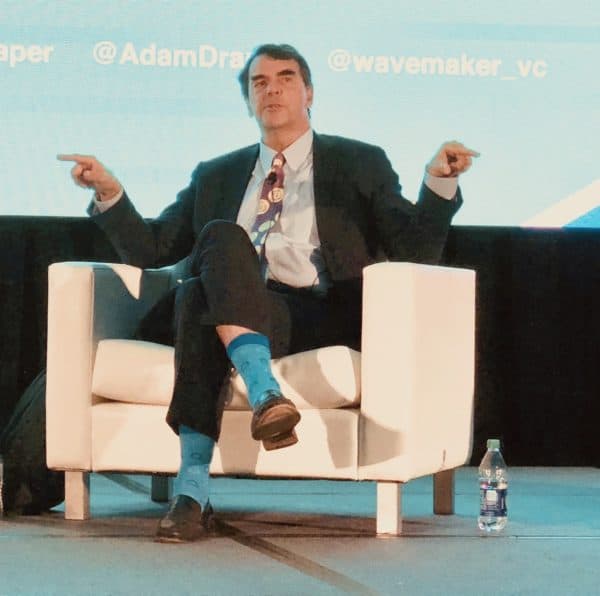Two defendants in a class action suit against the beleaguered but rich blockchain project Tezos have been exempted by a judge, though the case will proceed against the Tezos Foundation and DLS.
The decision by California Northern District Judge Richard Seeborg was filed yesterday in response to motions from defendants Tim Draper, Bitcoin Suisse AG, Dynamic Ledger Solutions (DLS) and the Tezos Foundation asking that the case against them alleging they sold or aided the sale of unregistered securities be dismissed.
According to ETHnews, “Lawyers for the defendants moved to dismiss the lawsuit on multiple grounds, one of which essentially argued that the case should be heard elsewhere, namely, Switzerland, where the foundation is based.”
Complaints against Draper and Bitcoin Suisse AG were dismissed though plaintiffs have 20 days to amend their complaint against Draper, a first round VC investor in the Tezos scheme.
Judge Seeborg characterized Draper as a “well known technology investor” whose public appearances promoting Tezos may have enhanced the perceived legitimacy of the venture.
The claims against Bitcoin Suisse AG were also dismissed on jurisdictional grounds after the company successfully argued it served no Americans in the Tezos token sale.
The much-anticipate token sale to fund Tezos’ proposed “self-amending crypto-ledger” blockchain project raised over $232 million dollars in the first two weeks of July last year.
Subsequent protracted, public and acrimonious internal disputes over governance and claims of non-cooperation and incompetence, however, delayed the project and may have depressed the token’s performance on exchanges.
Background provided by the judge claims Tezos founders Kathleen and Artur Breitman maintained close personal control of the project despite establishing a, “purportedly independent non-profit…intended to overseethe ICO,” namely the Tezos Foundation. The judge wrote:
“Even as the Foundation made outwardly autonomous gestures—creating a board of directors, hiring an American spokesperson (Ross Kenyon), and disseminating that spokesperson’s “how-to” video for prospective ICO participants—the Breitmans’ close advisory role drew its independence into question…”
The judge also noted, “(O)ne of the Foundation’s original directors…indicate(d) that the Breitmans ‘control the foundation’s domains, websites and email servers, so the foundation has no control or confidentiality in its own communications.’”
The judge also identified Kathleen Breitman as a chief promotor of Tezos, stating that while she was careful on internet forums not to characterize the Tezos fundraise as an ICO (initial coin offering), which some have characterized as a thinly-veiled offering of securities, Breitman slipped up when she wrote that Tezos “tokens” would be distributed for “initial investments.”
The judge also questioned certain terms in the token sale, including a promise from the foundation that it would, “reward donations by ‘recommending’ (token buyers) be awarded a commensurate token allocation.”
The judge called that aspect of the deal ‘asymmetric’ because, “Contributors, who were to give in either Bitcoin or Ethereum, could not retract donations once recorded on the blockchain ledger.”
Still, the judge seemed to suggest litigious overreach on the part of class action lead plaintiff Arman Anvari, who says he contributed 250 ether to the token sale:
“Significantly, (Anvari) does not allege pre-contribution awareness of any of the defendant-specific promotional or procedural activity recounted above. He does not, in other words, claim to have read the Breitmans’ posts, watched the Foundation’s how-to video, or been aware of Draper’s involvement. Nor, for that matter, does he allege to have engaged in any transactions through Bitcoin Suisse, or to have been ignorant of the purportedly governing Contribution Terms. All the same, he claims he was a victim of an unregistered securities sale, and seeks rescission plus assorted damages for all contributors.”
The Judge also said Anvari’s complaints against Bitcoin Suisse were weak, and, “plainly failed” to establish jurisdictional relevance because Anvari,“…(did) not allege his having in any way known of or utilized Bitcoin Suisse’s services…”
“In light of these shortcomings,” wrote the judge, the exercise of personal jurisdiction over Bitcoin Suisse is improper… (and) Anvari’s claims against Bitcoin Suisse must therefore be dismissed without leave to amend.”
So, while the judge ultimately determined that the Breitman’s actions can be tried under US jurisdiction because:
- “The California-based Breitmans were the de facto U.S. marketing arm of theFoundation.”
- “The Foundation engaged in little to no marketing of the ICO anywhere other thanin the U.S.”
- “An accordingly significant portion of the some 30,000 contributors to the ICOwere in fact U.S. citizens.”
…the judge also claimed that Anvari’s submissions were “conspicuously silent” about whether or not he was completely aware of the terms of the Tezos token sale, and suggested that, if it can be proven that he was reasonably aware of the terms, legal precedent meant that his complaint might be subject to what would, “ultimately prove to be fleeting procedural mercy.”


